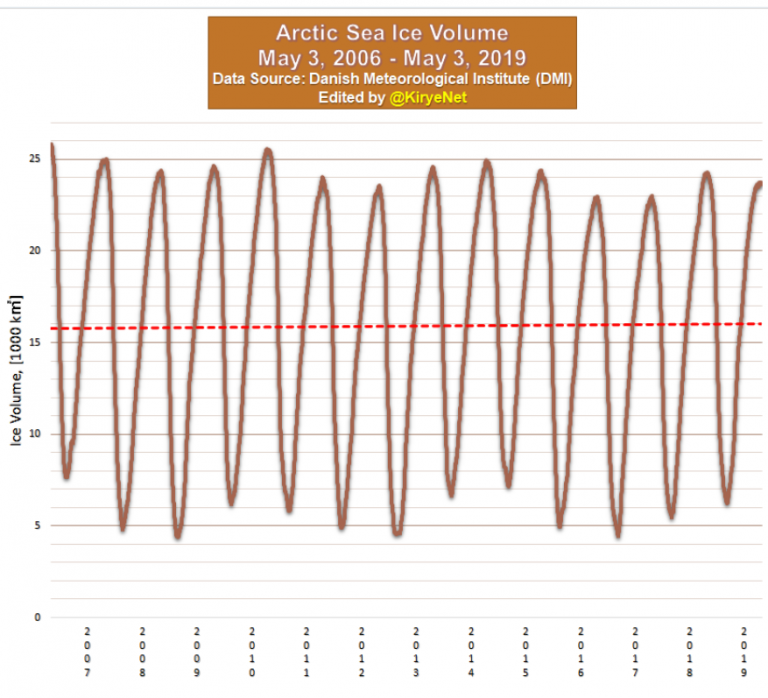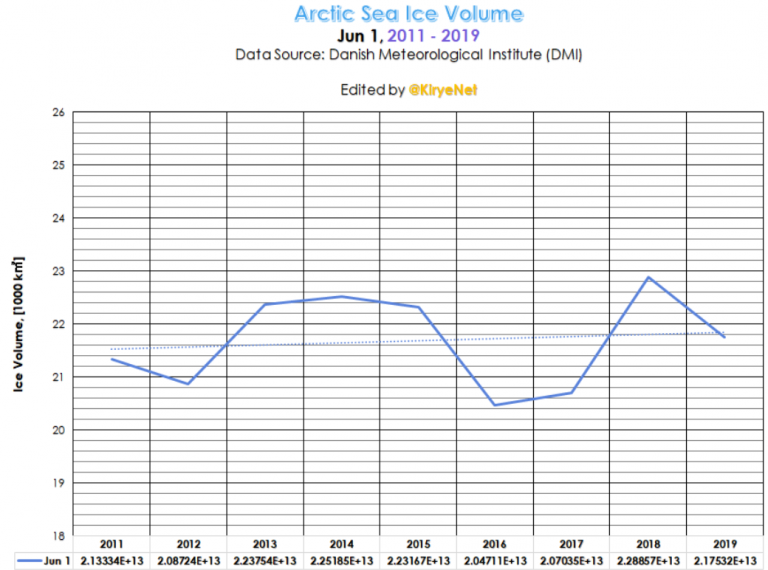Modelled data by the Danish Meteorological Institute (DMI) show that Arctic sea ice stopped shrinking 13 years ago, defying earlier predictions made by climate scientists and models.
By Kirye
and Pierre Gosselin
A few days ago we showed how Antarctica’s coastal stations were in fact cooling somewhat rather than warming. This came as a surprise to many.
And now that it’s June 1st, with the Arctic melt season starting in earnest, it is a good time to check Arctic ice volume. Here as well we find an equally surprising trend. Instead of shrinking rapidly — as is often claimed by the .global warming by alarmist scientists and the click-sleaze media — Arctic sea ice volume has not shrunk in 13 years!
Surprise. Arctic sea ice volume has not fallen in 13 years. Data source: Danish Meteorological Institute (DMI).
As the above chart shows, the ice has in reality even grown a bit!
The figures are based on calculations using DMI’s operational ocean and sea ice model HYCOM-CICE.
This is why today it’s more important than ever to keep the focus on the real data and not the hysterical headlines that currently dominate the hype-filled media.
And when we look at Arctic sea ice volume each year for June 1st this decade and plot it, we get the following:
June 1st Arctic ice volume on June 1st has increased so far this decade. Data: DMI.
Lo and behold: the chart above shows that early June ice volume has trended up over the current decade.
How can anyone say the Arctic ice has been rapidly melting recently? The answer is that they can’t. Anyone claiming otherwise is just plain lying.







Who are the climate scientists astounded by this?
All the alarmist ones who believed their own junk theory. But don’t expect them to come out and say they’re surprised.
“How can anyone say the Arctic ice has been rapidly melting recently?”
An important word here is “recently.”
It appears to me that Arctic Ocean ice is episodic, but not quite cyclic. Whatever the long term cycles (or near cycles) are can be interrupted by some event — blowout of ice arches because of a big storm — that makes visualizing the history of the region difficult.
The current stability may be the low of an inflection (or not), and the next few years will see ice growth.
In either case, the tool of an “ice free Arctic” by alarmists has lost its power, and they have moved to a new dread. It has take 30 years of it not happening for them to catch on. Seems “sea level rise” is the currently voiced mantra. That’s not happening either.
What’s next?
What’s next?
Extinction, ocean acidification, extreme weather. The mantra will carry on.
“Arctic to be free by 1989”
https://realclimatescience.com/2019/06/experts-arctic-to-be-ice-free-by-1989/
Experts?
[…] No Tricks Zone – Climate Scientists Astounded…No Arctic Ice Loss In 13 Years… Early June A… […]
Less ice gives warming sea and a tipping point is reached.
Falsified!
[…] Full post […]
The ones lying are those who start a time series at a well known outlier (record ice loss around 2006).
http://woodfortrees.org/plot/nsidc-seaice-n/compress:12/plot/nsidc-seaice-n/trend
And yeah, I still read this blog, but figured commenting on most of the nonsense doesn’t make sense since you guys made up your mind. There is nothing that can “astound” you 😉 Keep up the good work of making “skeptics” look ridiculous.
… did a tree fall in the woods somewhere? I didn’t hear it.
Sebastian old mate,
We are all most thankfull to the good Lord that your mind is wide open.
It’s now considered “consensus” that only about 50% of the Arctic ice melt is anthropogenic. The rest is natural. Do you agree?
England et al., 2019
https://journals.ametsoc.org/doi/abs/10.1175/JCLI-D-18-0864.1
“Over the last half century, the Arctic sea ice cover has declined dramatically. Current estimates suggest that, for the Arctic as a whole, nearly half of the observed loss of summer sea ice cover is not due to anthropogenic forcing, but due to internal variability.”
Ding et al., 2019
https://www.nature.com/articles/s41561-018-0256-8
“internal variability contributes to about 40–50% of observed multi-decadal decline in Arctic sea ice.”
Zhang et al., 2015
https://www.pnas.org/content/112/15/4570
“The above estimates suggest that internal variability associated with the three key predictors could have contributed substantially to the observed summer Arctic sea ice decline. Hence internal variability could be as important as anthropogenic forcing in the observed summer Arctic sea ice decline.”
Considering SH sea ice has been on an increasing trend since the late 1970s, what percentage of the SH sea increase is anthropogenic vs. natural?
@Kenneth
I would hazard a guess that the claim of ~50% ice loss being anthropogenic is an upper bound. I would not be surprised if it turns out to be much less, even close to zero.
But your approach is reasonable, claiming only what the evidence currently clearly supports. It will be hard enough getting them to admit even that.
I agree. But we’re talking about SebastianH, who believes 100% of the warming since 1950 is anthropogenic. We’ll see if he denies the “consensus” on Arctic sea ice loss as half-natural.
Even the Arctic warming since 1979 is said to be “substantially” due to “unforced natural variability.”
So I wonder what percentage of the cooling in Antarctica is due to humans. 50% too? After all, increasing CO2 causes cooling there.
Ah, settled science.
Kenneth
How much of Arctic melting is human caused.
Zero. To estimate 50% is pure nonsense. How about identifying the mechanism that controls the summer reduction and then start attributing causation.regards
I agree. My reply was to someone who believes in 100% ice melt causation from human CO2 emissions (SebastianH). It was intended to see if he’d be willing to acknowledge that not even do publishing scientists agree with his 100% human causation beliefs.
Mechanism that controls summer reduction (ice sheet/sea ice):
https://advances.sciencemag.org/content/3/6/e1700584
https://agupubs.onlinelibrary.wiley.com/doi/10.1029/2008GL033451
I am not willing to acknowledge anything when you highjack valid criticism of how skeptics imagine the Arctic to be stable now with an unrelated question.
So, sorry Kenneth. Feel free to make this some kind of strawman thing and continue to imagine what the blogpost above says … I’m out.
They started to measure sea ice extent when the Titanic sank.
https://www.youtube.com/watch?v=nIEGo8E9s_8
Good records go back to before WW2.
bit like starting Artic ice data at the all time highs of 1979 would you say ?
Sebastian, when accusing others of lying, keep in mind an old adage. When one points an accusatory finger, 3 fingers point back at the accuser.
1) Artic sea ice extent was anomalously high (for the 1940-present time span) at the beginning of the woodfortrees graph. So, are you guilty of deceiving the ill informed by cherry picking the starting point for a trend?
2) Between the mid 1700s (which was during the Little Ice Age) and 1940 or so, Artic sea ice extent was repeatedly less than or similar to the 2006-present coverage between Europe and N. America. Ship logs document this.
3) NoTricks referenced the 2006-present period to support a point made by climate REALISTS. Reality made fools of those who forecast the disappearance of Artic sea ice. Shrinkage STOPPED, rather than continued. Even the treesforwood graph shows LITTLE or NO SHRINKAGE since 2006.
DM, please tell the author of the blogpost this old adage. Thanks.
1) no
2) if you believe so, why do you think that could be possible?
3) no, it didn’t stop. You can’t use outliers to claim something like this.
“The ones lying are those who start a time series at a well known outlier…” – SebH
Your complaint is frivolous because what is being done is focusing on what has been happening recently in order to show that it is NOT what they say has been happening recently. There’s no point in focusing on the past when what we are talking about is the present.
No one on our side is trying to hide anything, but what about what your side does Let’s take a look. If you want context, here’s the time series from the beginning of modern records.
https://m.youtube.com/watch?v=nIEGo8E9s_8
There Tony Heller exposes your heroes as being the real liars. And the funny thing is that they are doing just what you falsely accuse us of.
Whatever suits you I guess …
What “suits” me is reality.
https://www.weaselzippers.us/422763-climate-oops-national-park-begins-subtle-removal-of-gone-by-2020-signs-after-glaciers-just-keep-not-being-gone/
You can have the fantasy.
Quite frankly I could not care less if both poles completely melted.
Aside from that there are nutters who believe that there is advanced alien technology buried on the south pole.